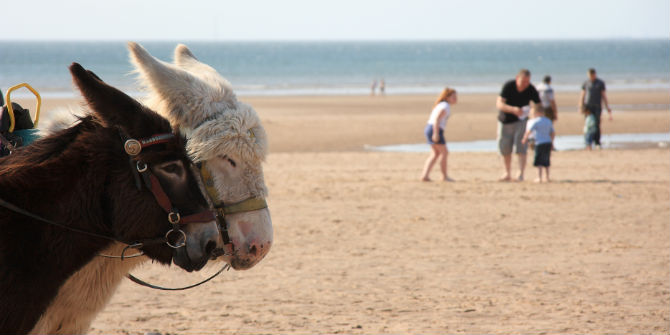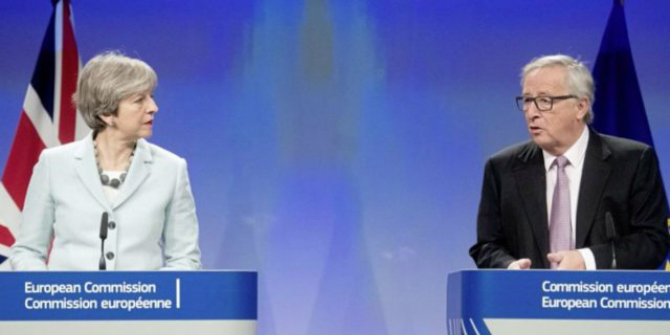The UK risks being torn further apart by Brexit than it has been already. In this blog, Vi ctoria Mason argues that one cannot conflate national identity and Euroscepticism, because the meaning of national identity is multivalent, changing, malleable, and conflicted: nowhere more so than in the UK, and especially in Northern Ireland. In result of the Brexit vote, however, antithetical manifestations of national identity are now pulling the UK in opposite directions.
ctoria Mason argues that one cannot conflate national identity and Euroscepticism, because the meaning of national identity is multivalent, changing, malleable, and conflicted: nowhere more so than in the UK, and especially in Northern Ireland. In result of the Brexit vote, however, antithetical manifestations of national identity are now pulling the UK in opposite directions.
Former Chancellor George Osborne now says that the Conservative party got it wrong in the run-up to the referendum. It was, he says, an error to allow immigration and national sovereignty to become intertwined and they ‘didn’t make enough of the value of immigration’.
While immigration is the narrative that has dominated political discourse, it is only part of the story of Brexit. Since 2015, the number of migrants crossing the Mediterranean to Europe has fallen rapidly, from 1.2 million in that year to just 171,635 in 2017. The influx of asylum-seekers has abated. Yet the flurry of headlines predicting the death of a borderless Europe – and the rise of many anti-immigration movements – has not. That is because the question they are posing is not so much whether the infrastructure of Europe can withstand the demographic implications of free movement, but whether the people of Europe are committed to an identity as Europeans. When it comes to immigration, it is the narrative and not the numbers that count.
In the UK, at least, that narrative has become intimately entangled with another, namely that of ‘wartime Britain’. The now ubiquitous ‘Keep Calm and Carry On’ phenomenon typifies the supposedly distinctively British sensibility of the ‘stiff upper lip’. The combination of British particularity and nostalgia for the Britain of seventy years ago has proved a potent and popular formula. Its rise has been accompanied by a growing raft of cultural events and media tributes dedicated to the 1940s, and increasing fondness for the perceived innocence, resilience and pride of ‘Britain at war’.
The politicisation of poppies is another case in point, as anyone living in the UK who has ventured beyond their front door or turned on the television in the past few weeks will have witnessed. Since 1921, poppies have been worn in the UK to commemorate the war dead in the period around Armistice Day. Once an uncontroversial, discreet act of remembrance, they have become the patriot’s litmus test. Nigel Farage, former leader of UKIP, was pictured weeping before a poppy memorial in 2014. When FIFA ruled that the England football team could not wear black armbands with poppies for their World Cup Qualifier in 2016, newspapers threw up their arms in protest. The Prime Minister, Theresa May, called the decision ‘utterly outrageous’. Yet, in 1987, the England football team had played Yugoslavia on Remembrance Day without donning poppies, and no one batted an eyelid.
 © Copyright Albert Bridge and licensed for reuse under this Creative Commons Licence.
© Copyright Albert Bridge and licensed for reuse under this Creative Commons Licence.
This matters not simply because it is symptomatic of an increasingly vocal nationalism. It matters because it is a nationalism which nurtures, and is nurtured by, nostalgia for war. War is the stuff of frontiers, which become the markers of success or failure. It was, of course, British and French refusal to tolerate the trespassing of the Polish border by Germany that finally pushed Europe over the brink into the Second World War. That conflict had appeared ever more inevitable as German forces defied one border after another – the Rhineland, Austria, the Sudetenland. Those invasions flew in the face of the border constraints imposed by the treaties born of the previous war that century. Borders delineate difference, impose order, embody power. The most potent frontier of all is the one drawn between ‘us’ and ‘them’, upon which every conflict depends. There can be no blurred lines.
In the immediate aftermath of the Second World War, the painfully evident cost of conflict – and the threat of more in the shape of the Cold War – made cooperation infinitely more desirable. Sir Winston Churchill, wartime Prime Minister and patriotic icon, wrote in 1942: “Hard as it is to say now… I look forward to a United States of Europe, in which the barriers between the nations will be greatly minimised and unrestricted travel will be possible.” It was a sentiment he would repeat throughout the post-war period. It was similarly unthinkable in 1998 that anyone would ever view a hard border in Ireland as anything short of dangerous. Distance from war has softened its edges and sanitised its atrocities. It has allowed the hard borders which war keeps alive to become a source of hope instead of despair.
It is too often taken as read that ‘national identity’ is the threat to Europeanism. But a glance at the past few years of European politics shows that reality is more complex. It is the terms in which that national identity is defined – and not its mere existence – which matter. For many of the 16,141,241 people throughout the UK who voted to remain in the EU, Brexit has been a betrayal of national identity, and not its fulfilment. The shock victory of the UK’s ‘Leave’ campaign has galvanised the pro-European voice in ways previously unseen. In 2016, the year of the referendum, British applications for citizenship of other EU member states more than doubled. Hundreds of thousands have taken to the streets of London in multiple pro-EU protests.
And, notably, two of Europe’s most ardent nationalist campaigns in recent years have been mounted by committed supporters of the European Union. While the Catalan drive for independence from Spain has proved a headache for the EU, it is Madrid, and not Europe, that Catalan separatists see as the oppressor. Carlos Puigdemont continually reassured voters that Catalonia intended to be admitted to the EU after independence (albeit a sentiment not reciprocated by the EU).
Likewise, the (ultimately unsuccessful) Scottish campaign for independence from the UK insisted throughout the run-up to the 2014 referendum that they would seek membership of the EU as an independent nation. And, when the UK overall voted to leave the EU in 2016, Scottish nationalists saw this as paving the way for a re-run of the independence poll, since a majority in Scotland had, in fact, voted to remain. In Scotland and Catalonia, the EU is the saviour of national identities allegedly suppressed by London and Madrid respectively. It is the mechanism by which smaller states can maintain their autonomy while flourishing politically and economically. In Scotland’s case, commitment to the European project has become a further marker of its divergence from its southern Eurosceptic neighbour.
As in Scotland, the majority of voters in Northern Ireland also voted to remain in the EU. Despite the casual rhetoric of Jacob Rees-Mogg, it is unsurprising that no acceptable solutions are forthcoming for the conundrum of what to do with the Irish border. A Europe of soft borders was the crucial third leg of the stool not only of a political deal, but the much thornier question of what it meant to be from Northern Ireland. In the Northern Ireland of the EU, no choice needed to be made between being British and Irish. EU citizenship allowed people to belong to both simultaneously. It did not suppress local, regional or national identities. It enabled – and continues to enable – a multiplicity of overlapping identities much more fit for modern states and their complex histories.
Pro-Brexit media channels seek to conflate national identity and Euroscepticism. But the meaning of national identity is multivalent, changing, malleable, conflicted: nowhere more so than in the UK. It is not self-evident, its consequences not inevitable. Its antithetical manifestations are pulling the UK in opposite directions. Unless this is acknowledged, the UK risks being torn further apart by Brexit than it has been already.
This article gives the views of the authors, and not the position of LSE Brexit, nor of the London School of Economics and Political Science. The Hubert Butler Essay Prize is organised by the newly founded European arts charity HEART London, which promotes the best of European liberal values in the arts – values that Hubert Butler embodied.







I agree completely with this interesting essay.
It is certainly amazing that as the First and Second World Wars become increasingly distant, they are increasingly used to promote an insular British nationalism. Yet the very cause of those wars was the insular nationalism prevalent in Europe at the time.
One little niggle. The essay refers to the 13.2 million people “in the UK” who voted Remain in 2016. This was of course only the Remain vote “in England”. The Remain vote in the UK as a whole was 16.1 million people.
Many thanks for spotting this, we’ve updated the text accordingly.
This is a very thoughtful post and is much more powerful than the mere economic arguments that have been deployed.
I did hear a recent pro-Brexit speech from Jacob Rees-Mogg where he talked about British victories in the Hundred Years’ War. This rang particularly false for me as a Scot as of course Scotland was on the other side to England.
Indeed rather than the “1000 years of history” that we hear, the UK state with its present borders is less than a century old and like many new states is still quite fragile.